The Intel SSD 320 Review: 25nm G3 is Finally Here
by Anand Lal Shimpi on March 28, 2011 11:08 AM EST- Posted in
- IT Computing
- Storage
- SSDs
- Intel
- Intel SSD 320
Random Read/Write Speed
The four corners of SSD performance are as follows: random read, random write, sequential read and sequential write speed. Random accesses are generally small in size, while sequential accesses tend to be larger and thus we have the four Iometer tests we use in all of our reviews.
Our first test writes 4KB in a completely random pattern over an 8GB space of the drive to simulate the sort of random access that you'd see on an OS drive (even this is more stressful than a normal desktop user would see). I perform three concurrent IOs and run the test for 3 minutes. The results reported are in average MB/s over the entire time. We use both standard pseudo randomly generated data for each write as well as fully random data to show you both the maximum and minimum performance offered by SandForce based drives in these tests. The average performance of SF drives will likely be somewhere in between the two values for each drive you see in the graphs. For an understanding of why this matters, read our original SandForce article.
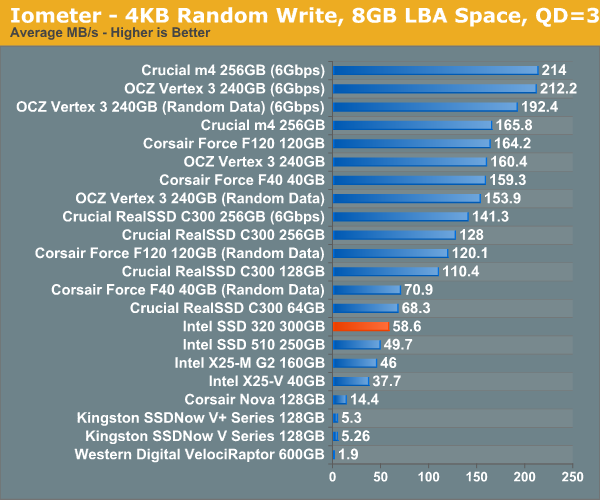
Random write speed is improved compared to the 510 thanks to Intel's controller, but we're only looking at a marginal improvement compared to the original X25-M G2.
Many of you have asked for random write performance at higher queue depths. What I have below is our 4KB random write test performed at a queue depth of 32 instead of 3. While the vast majority of desktop usage models experience queue depths of 0 - 5, higher depths are possible in heavy I/O (and multi-user) workloads:
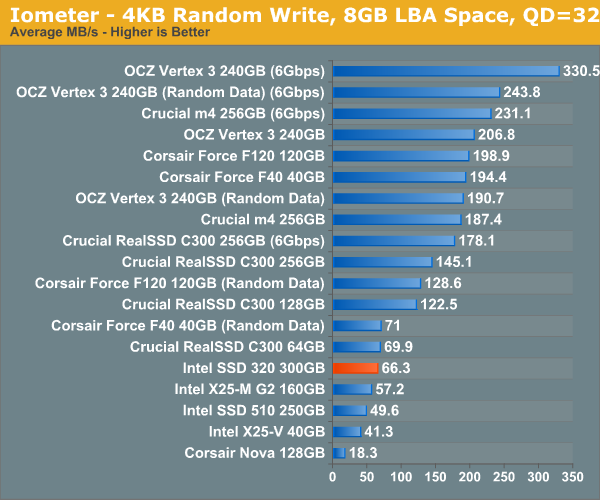
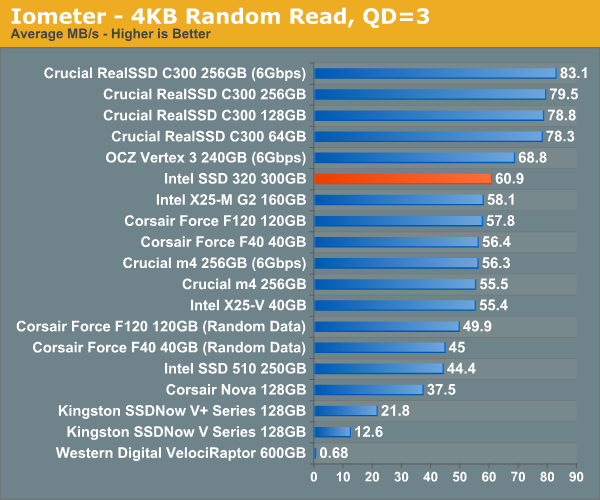
Random read performance has always been a strong point of Intel's controller and the 320 is no different. While we're not quite up to C300 levels, the 320 is definitely competitive here.
Sequential Read/Write Speed
To measure sequential performance I ran a 1 minute long 128KB sequential test over the entire span of the drive at a queue depth of 1. The results reported are in average MB/s over the entire test length.
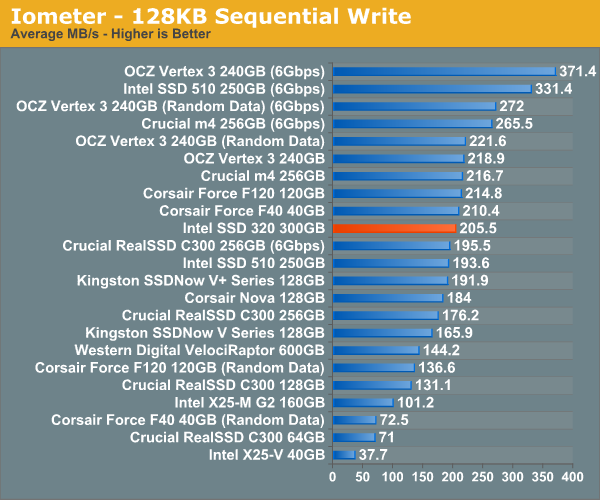
Without a 6Gbps interface the 320's performance is severely limited. Compared to other 3Gbps drives the 320 is quite good here though.
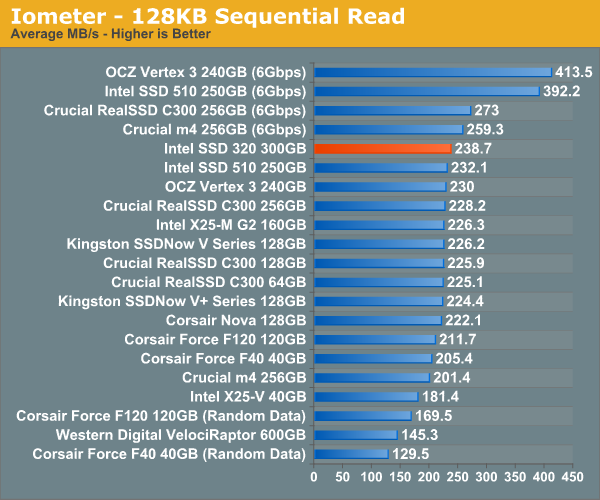
Read performance is at the top of the chart for 3Gbps drives. I wonder how far Intel would've been able to push things if the 320 had a 6Gbps controller.










194 Comments
View All Comments
NandFlashGuy - Monday, March 28, 2011 - link
Actual data shows that Intel's G2 SSD Reliability is already ahead of mechanical drives:Here's a paper at the 1997 FAST conference discussing actual hard drive failure rates:
http://www.cs.toronto.edu/~bianca/papers/fast07.pd...
A link to the French e-tailer return rate data showing Intel SSDs better than mechanical drives:
http://www.hardware.fr/articles/810-6/taux-pannes-...
A good talk discussing SSD failure rates and mechanisms:
http://intelstudios.edgesuite.net/idf/2010/sf/aep/...
Have any real data to support your claim?
NandFlashGuy - Monday, March 28, 2011 - link
Correcxtion. The FAST paper was from 2007.nonzenze - Monday, March 28, 2011 - link
We were promised Vertex 3 end of March. Didn't happen. At least the Intel 510s are on Newegg ... This review has no mention at all of availability, which I take to be a terrible sign that we won't actually see these in time.Meanwhile it's utterly impossible to plan a build for a new machine with a next-gen SSD because I have no idea when I'll actually be able to order and receive one!
Soft launches suck!
turbodreams - Monday, March 28, 2011 - link
You write "The AS-SSD sequential benchmark takes place at a very high queue depth of 32". This is not correct, as it takes place at QD 1. I asked the author of the benchmark about this, *only* the 4K-64 test uses a higher QD of 64.Anand Lal Shimpi - Monday, March 28, 2011 - link
That's very odd. Perfmon reports a queue depth of 1 however one of our internal monitoring tools indicates a queue depth of 32. I will remove the reference but I'm curious to see what's going on here.Take care,
Anand
WintersEdge - Monday, March 28, 2011 - link
I'm confused. The benchmarks show results for the Crucial M4. Where is the full review for that drive? Did I miss something? Thanks.Shadowmaster625 - Monday, March 28, 2011 - link
$160 for a 74GB SSD? And it is just as slow as the last generation? They are absolutely out of their freakin minds. They're gouging the hell out of their trusting victims. I wont even comment on how awful the 40GB version is, for $90. LOL I just bought an Agility 2 for $90.Chloiber - Tuesday, March 29, 2011 - link
And how happy are you with 35MB/s seq. Write and less than 200 seq. Read?erple2 - Monday, March 28, 2011 - link
What? So you did a hack that Apple doesn't fully support, and expect that if it implodes, you get to complain about it?Really?
I'm disappointed in you, Brian.
overzealot - Tuesday, March 29, 2011 - link
It was a joke. Lighten up.